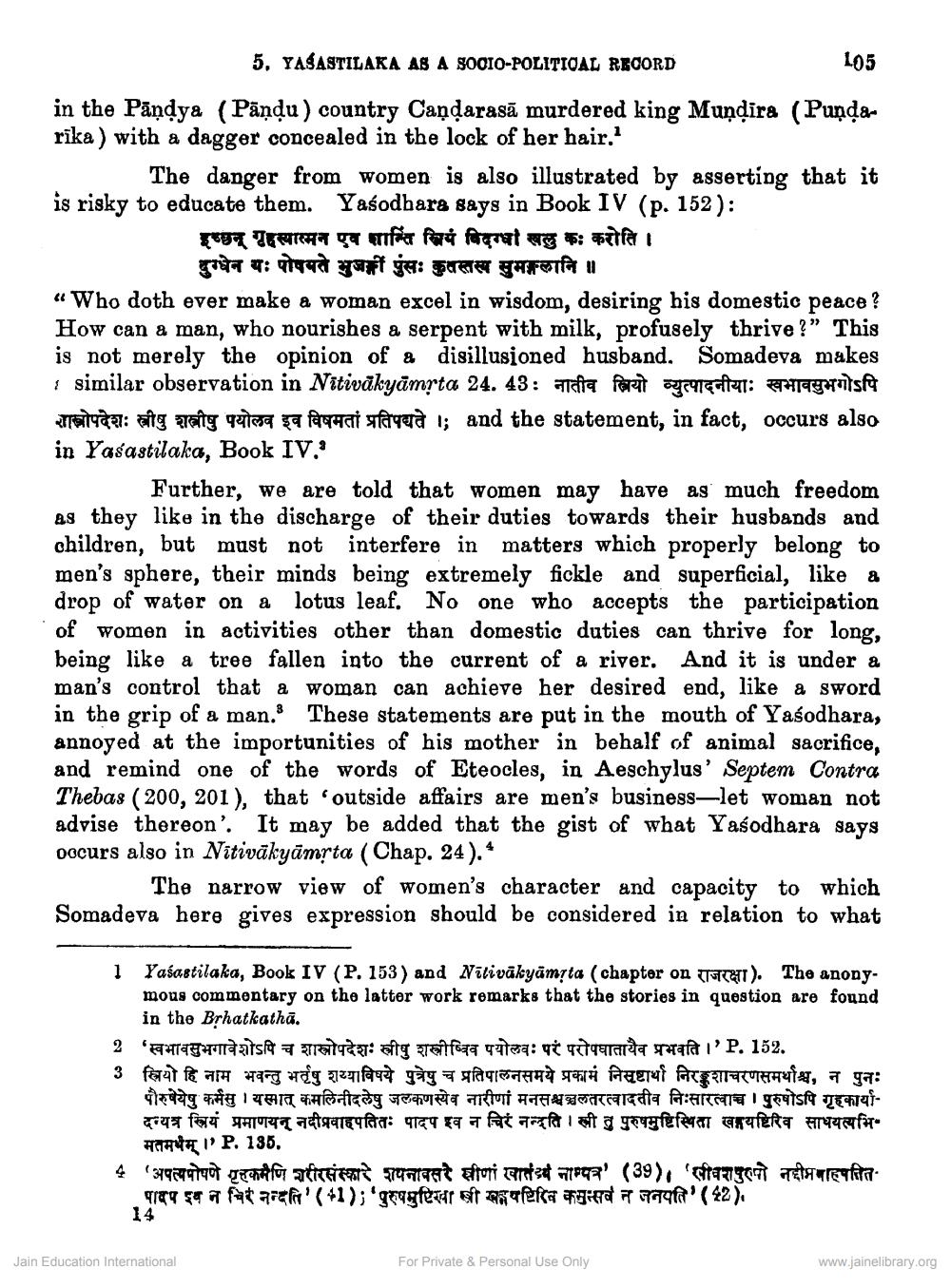________________
5. YASASTILAKA AS A SOCIO-POLITICAL RECORD
105 in the Pāņdya (Pāņdu) country Caņdarasā murdered king Mundira (Pundarika) with a dagger concealed in the lock of her hair.'
The danger from women is also illustrated by asserting that it is risky to educate them. Yasodhara says in Book IV (p. 152):
इन्छन् गृहस्यास्मन एव शान्ति स्त्रियं विदग्धी खलु कः करोति ।
दुग्धेन यः पोपपते भुजङ्गी पुंसः कुतस्तस सुमङ्गलानि ॥ “Who doth ever make a woman excel in wisdom, desiring his domestic peace ? How can a man, who nourishes a serpent with milk, profusely thrive ?” This is not merely the opinion of a disillusioned husband. Somadeva makes 1 similar observation in Nitivakyāmrta 24. 43: zraia ferait ayrurgettet: Tiraganito prelidat: antg granty outea sa farai sagad i; and the statement, in fact, occurs also in Yasastilaka, Book IV.:
Further, we are told that women may have as much freedom as they like in the discharge of their duties towards their husbands and children, but must not interfere in matters which properly belong to men's sphere, their minds being extremely fickle and superficial, like & drop of water on a lotus leaf. No one who accepts the participation of women in activities other than domestic duties can thrive for long, being like a tree fallen into the current of a river. And it is under a man's control that a woman can achieve her desired end, like a sword in the grip of a man. These statements are put in the mouth of Yasodhara, annoyed at the importunities of his mother in behalf of animal sacrifice, and remind one of the words of Eteocles, in Aeschylus' Septem Contra Thebas (200, 201 ), that outside affairs are men's business-let woman not advise thereon'. It may be added that the gist of what Yasodhara says oocurs also in Nitivākyāmrta (Chap. 24).
The narrow view of women's character and capacity to which Somadeva here gives expression should be considered in relation to what
1 Yasastilaka, Book IV (P. 153 ) and Nītivākyämsta (chapter on THT). The anony
mous commentary on the latter work remarks that the stories in question are found
in the Brhatkathā. 2
ts Tract: afy ralfs9 ruta: që targa safat I'P. 152. 3 स्त्रियो हि नाम भवन्तु भर्तृषु शय्याविषये पुत्रेषु च प्रतिपालनसमये प्रकामं निसृष्टार्था निरङ्कशाचरणसमर्थाश्च, न पुनः
पौरुषेयेषु कर्मसु । यस्मात् कमलिनीदलेषु जलकणस्येव नारीणां मनसश्चञ्चलतरत्वादतीव निःसारत्वाच । पुरुषोऽपि गृहकार्यादन्यत्र स्त्रियं प्रमाणयन् नदीप्रवाहपतितः पादप इव न चिरं नन्दति । स्त्री तु पुरुषमुष्टिस्थिता खगयष्टिरिव साधयत्यभि
HAI P. 135. 4 (
3990 forio fre n tant stori Erts 77899' (39), fra 79674 Terra 99 54 afat arefi' (+1); 'gragteur f lera olika ' ( 42).
14
Jain Education International
For Private & Personal Use Only
www.jainelibrary.org




